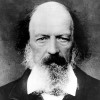The first symptom is that hair grows on your ears. It’s very disconcerting.
Edward G. Robinson (1893-1973) American stage and film actor [b. Emanuel Goldenberg]
All My Yesterdays: An Autobiography, “Epilogue” (1973) [with Leonard Spigelgass]
(Source)
On growing old.
Quotations about:
aging
Note not all quotations have been tagged, so Search may find additional quotes on this topic.
But now at thirty years my hair is gray ––
(I wonder what it will be like at forty?
I thought of a peruke the other day)
My heart is not much greener; and, in short, I
Have squander’d my whole summer while ’twas May,
And feel no more the spirit to retort; I
Have spent my life, both interest and principal,
And deem not, what I deem’d, my soul invincible.
For the complete life, the perfect pattern, includes old age as well as youth and maturity. The beauty of the morning and the radiance of noon are good, but it would be a very silly person who drew the curtains and turned on the light in order to shut out the tranquility of the evening. Old age has its pleasures, which, though different, are not less than the pleasures of youth.
W. Somerset Maugham (1874-1965) English novelist and playwright [William Somerset Maugham]
The Summing Up, ch. 73 (1938)
(Source)
We take all things in a minor key as we grow older. There are few majestic passages in the later acts of life’s opera. Ambition takes a less ambitious aim. Honor becomes more reasonable and conveniently adapts itself to circumstances. And love — love dies. “Irreverence for the dreams of youth” soon creeps like a killing frost upon our hearts. The tender shoots and the expanding flowers are nipped and withered, and of a vine that yearned to stretch its tendrils round the world there is left but a sapless stump.
Jerome K. Jerome (1859-1927) English writer, humorist [Jerome Klapka Jerome]
Idle Thoughts of an Idle Fellow, “On Being In Love” (1886)
(Source)
The quoted line is from Longfellow, "The Ladder of St. Augustine."
How dull it is to pause, to make an end,
To rust unburnish’d, not to shine in use!
As tho’ to breathe were life. Life piled on life
Were all too little, and of one to me
Little remains: but every hour is saved
From that eternal silence, something more,
A bringer of new things; and vile it were
For some three suns to store and hoard myself,
And this gray spirit yearning in desire
To follow knowledge, like a sinking star,
Beyond the utmost bound of human thought.
Old age is like learning a new profession. And not one of your own choosing.
Jacques Barzun (1907-2012) French-American historian, educator, polymath
In Arthur Krystal, “Age of Reason,” The New Yorker (2007-10-15)
(Source)
What a wretched lot of old shriveled creatures we shall be by-and-by. Never mind, — the uglier we get in the eyes of others, the lovelier we shall be to each other; that has always been my firm faith about friendship, and now it is in a slight degree my experience.
George Eliot (1819-1880) English novelist [pseud. of Mary Ann Evans]
Letter to Sara Hennell (1852-05-27)
(Source)
And if some god should offer me the privilege of returning to babyhood again, cradle, wailing, and all, I would absolutely refuse. I would have no desire, once my course were run, to be haled back from the race’s end to the starting-line.
[Et si quis deus mihi largiatur ut ex hac aetate repuerascam et in cunis vagiam, valde recusem, nec vero velim quasi decurso spatio ad carceres a calce revocari.]Marcus Tullius Cicero (106-43 BC) Roman orator, statesman, philosopher
De Senectute [Cato Maior; On Old Age], ch. 23 / sec. 83 (23.83) (44 BC) [tr. Copley (1967)]
(Source)
(Source (Latin)). Alternate translations:
And if some god wolde give me puissaunce that I whiche am an olde man myght retourne ayen in to childhode and that I shulde braye and krye in my swathyng cloth and in my cradelle like a childe, I wolde it not but I wolde even refuse it.
[tr. Worcester/Worcester/Scrope (1481)]
I will say more, if God would grant me now in this age to return again to my infancy and to be as young as a child that lieth crying in his cradle, I would refuse and forsake the offer with all my might; neither would I when I have already in a manner run the whole race and own the goal, be again revoked from the end marks to the lists, or place where I took my course at the first setting out. For who would be contented, when he hath gotten the best game, to be forced to race again for the same?
[tr. Newton (1569)]
And if any god would grant me to be now a child in my cradle againe, and to be young, I would refuse it. Neither would I, having runne my full course, be called back again.
[tr. Austin (1648)]
Should some God tell me, that I should be born,
And cry again, his offer I should scorn;
Asham'd when I have ended well my race,
To be led back, to my first starting place.
[tr. Denham (1669)]
And should any of the Gods give me the Liberty of beginning again the Circle of my Years, I should desire to be excused, and be unwilling to begin the Race again, when I am just arrived at the Goal.
[tr. Hemming (1716)]
Or should any heavenly Power grant me the Privilege of turning back, if I pleased, from this Age to Infancy, and to set out again from my Cradle, I would absolutely refuse it; for as I have now got well nigh to the End of my Race, I should be extremely unwilling to be called back, and obliged to start again.
[tr. Logan (1744)]
The sincere truth is, if some divinity would confer upon me a new grant of my life, and replace me once more in the cradle, I would utterly, and without the least hesitation, reject the offer; having well-nigh finished my race, I have no inclination to return to the goal.
[tr. Melmoth (1773)]
But if any god should grant me that I should become a boy again and wail in the cradle, I would strenuously decline it; nor indeed would I wish, as if I had run my course, to be called back from the goal to the starting-post.
[Cornish Bros. ed. (1847)]
For if any god should grant me, that from this period of life I should become a child again and cry in the cradle, I should earnestly refuse it: nor in truth should I like, after having run, as it were, my course, to be called back to the starting-place from the goal.
[tr. Edmonds (1874)]
Indeed, were any god to grant that from my present age I might go back to boyhood, or become a crying child in the cradle, I should steadfastly refuse; nor would I be willing, as from a finished race, to be summoned back from the goal to the starting-point.
[tr. Peabody (1884)]
Nay, if some god should grant me to renew my childhood from my present age and once more to be crying in my cradle, I would firmly refuse; nor should I in truth be willing, after having, as it were, run the full course, to be recalled from the winning-crease to the barriers.
[tr. Shuckburgh (1895)]
Nay, if some God should offer to me now
Once more to be a boy, and shed sad tears
Within my cradle, I'd refuse the gift.
Nor do I wish, my course being fully run,
To leave the winning for the starting post.
[tr. Allison (1916)]
Nay, if some god should give me leave to return to infancy from my old age, to weep once more in my cradle, I should vehemently protest; for, truly, after I have run my race I have no wish to be recalled, as it were, from the goal to the starting-place.
[tr. Falconer (1923)]
Indeed if some god granted me the power to cancel my advanced years and return to boyhood, and wail once more in the cradle, I should firmly refuse. Now that my race is run, I have no desire to be called back from the finish to the starting point!
[tr. Grant (1960; 1971 ed.)]
If I knew that some god had arranged for me to be transformed into an infant bawling in its cradle, I would make a dreadful fuss; once my race was run and I was coming down the final stretch, I would have no desire to be sent all the way back to the starting gate.
[tr. Cobbold (2012)]
And by the same token, if any miracle wouild grant me the chance to be a boy again and to cry in the nursery, I would certainly refuse. There is no way I want to be recalled, as it were, from the finish line to the starting blocks now that I have run the whole race.
[tr. Gerberding (2014)]
And if some god allowed me to get back again
To the cradle, as one of those crying toddlers,
From my ancient age, I’d refuse there and then.
Having run most of my course, I couldn’t face
To be recalled from the finish to the starting place.
[tr. Bozzi (2015)]
Truly, if some god graciously granted that I could put aside my years and start over, crying in my cradle again, I would vehemently refuse. Since I have almost finished my race, why would I want to be called back to the starting line?
[tr. Freeman (2016)]
Even if some god should permit that I would return to the time of my birth from this age, I would sternly refuse -- for, truly, I do not wish to restart as if to retrace a race run from the finish line to the starting post.
[tr. @sentantiq (2018), sec. 84]
Why do we get older? Why do our bodies wear out? Why can’t we just go on and on and on, accumulating a potentially infinite number of Frequent Flier mileage points? These are the kinds of questions that philosophers have been asking ever since they realized that being a philosopher did not involve any heavy lifting.
And yet the answer is really very simple: Our bodies are mechanical devices, and like all mechanical devices, they break down. Some devices, such as battery-operated toys costing $39.95, break down almost instantly upon exposure to the Earth’s atmosphere. Other devices, such as stereo systems owned by your next-door neighbor’s 13-year-old son who likes to listen to bands with names like “Nerve Damage” at a volume capable of disintegrating limestone, will continue to function perfectly for many years, even if you hit them with an ax. But the fundamental law of physics is that sooner or later every mechanism ceases to function for one reason or another, and it is never covered under the warranty.Dave Barry (b. 1947) American humorist
Dave Barry Turns 40, ch. 2 “Your Disintegrating Body” (1990)
(Source)
I’ve come up with a set of rules that describe our reactions to technologies:
1. Anything that is in the world when you’re born is normal and ordinary and is just a natural part of the way the world works.
2. Anything that’s invented between when you’re fifteen and thirty-five is new and exciting and revolutionary and you can probably get a career in it.
3. Anything invented after you’re thirty-five is against the natural order of things.
All wines don’t turn sour when they get old, and neither do all men or all personalities. I approve of sternness in the old, but a sternness that, like other things, is kept within limits; under no circumstances do I approve of bad temper.
[Ut enim non omne vinum, sic non omnis natura vetustate coacescit. Severitatem in senectute probo, sed eam, sicut alia, modicam; acerbitatem nullo modo.]Marcus Tullius Cicero (106-43 BC) Roman orator, statesman, philosopher
De Senectute [Cato Maior; On Old Age], ch. 18 / sec. 65 (18.65) (44 BC) [tr. Copley (1967)]
(Source)
(Source (Latin)). Alternate translations:
For as every wyne long kept and olde waxith not eagre of his owne propre nature, right so all mankynde is not aygre fell cruell ungracious chargyng nor inportune in olde age of their owne kynde though some men among many be fonde of that condicion. I approve & preyse in olde age the man which hath severitee & stidfast abydyng in hym. Seuerite is contynuance & perseverance of oon maner of lyvyng as wele in the thyngys within as in theym withoute. But I approve nat that in an olde man be egrenesse nor hardnesse & sharpnesse of maners of condicions.
[tr. Worcester/Worcester/Scrope (1481)]
For even as every wine being old and standing long is not converted into vineigre, so likewise is not every age sour, eigre, and unpleasant. Severity and sternness in old age I well allow and commend, so that a moderate mean therein (as in all other things) be observed; but bitterness and rigorous dealing I can in no wise brook nor away withal.
[tr. Newton (1569)]
For as all wines do not grow soure and tart in continuance, so not all age. I like severity in an old man, but not bitternesse.
[tr. Austin (1648), ch. 19]
Our nature here, is not unlike our wine,
Some sorts, when old, continue brisk, and fine.
So Age's gravity may seem severe,
But nothing harsh, or bitter ought to appear.
[tr. Denham (1669)]
In short, as it fares with Wines, so it does with Old Men: all are not equally apt to grow sour with Age. A serious and moderately grave Deportment well become us, but nothing of an austere Severity.
[tr. Hemming (1716)]
Thus it is, for as all Wines are not prick'd by Age, so neither is Human Life sower'd by Old Age; a Severity I approve of in Old Men, but with Moderation; Bitterness by no means.
[tr. J. D. (1744)]
Some Wines sour with Age, while others grow better and richer. A Gravity with some Severity is to be allowed; but by no means Ill nature.
[tr. Logan (1744)]
As it is not every kind of wine, so neither is it every sort of temper, that turns sour by age. But I must observe at the same time there is a certain gravity of deportment extremely becoming in advanced years, and which, as in other virtues, when it preserves its proper bounds, and does not degenerate into an acerbity of manners, I very much approve.
[tr. Melmoth (1773)]
For, as not every wine, so not every life, grows sour by age. Strictness in old age, I approve; but that, even as other things, in moderate degree: bitterness I nowise approve.
[Cornish Bros. ed. (1847)]
Neither every wine nor every life turns to vinegar with age.
[ed. Harbottle (1906)]
For as it is not every wine, so it is not every man's life, that grows sour from old age. I approve of gravity in old age, but this in a moderate degree, like everything else; harshness by no means.
[tr. Edmonds (1874)]
For as it is not wine of every vintage, so it is not every temper that grows sour with age. I approve of gravity in old age, so it be not excessive; for moderation in all things is becoming: but for bitterness I have no tolerance.
[tr. Peabody (1884)]
The fact is that, just as it is not every wine, so it is not every life, that turns sour from keeping. Serious gravity I approve of in old age, but, as in other things, it must be within due limits: bitterness I can in no case approve.
[tr. Shuckburgh (1895)]
Not every wine grows sour by growing old.
Severity in age is well enough:
But not too much, and naught of bitterness.
[tr. Allison (1916)]
As it is not every wine, so it is not every disposition, that grows sour with age. I approve of some austerity in the old, but I want it, as I do everything else, in moderation. Sourness of temper I like not at all.
[tr. Falconer (1923)]
Human nature is like wine: it does not invariably sour just because it is old. Some old men seem very stern, and rightly so -- although there must be, as I always say, moderation in all things. There is never any reason for ill temper.
[tr. Cobbold (2012)]
Certainly neither all wines go sour
Nor do all men because of agedness.
I approve of old men’s calm severity,
But I don’t put up with those who are dour.
[tr. Bozzi (2015)]
The truth is that a person's character, like wine, does not necessarily grow sour with age. Austerity in old age is proper enough, but like everything else it should be in moderation. Sourness of disposition is never a virtue.
[tr. Freeman (2016)]
Growing old is no more than a bad habit which a busy man has no time to form.
André Maurois (1885-1967) French author [b. Émile Salomon Wilhelm Herzog]
The Art of Living, ch. 8 “The Art of Growing Old” (1940) [tr. Whitall]
(Source)
Like our shadows,
Our wishes lengthen, as our sun declines.Edward Young (1683-1765) English poet
The Complaint: Or, Night Thoughts, Vol. 1, No. 5 “Night the Fifth: The Relapse,” ll. 661-662 (1743-12) (1744)
(Source)
Age imprints more wrinkles in the mind than it does on the face; and souls are never, or very rarely seen, that, in growing old, do not smell sour and musty.
[Elle nous attache plus de rides en l’esprit qu’au visage : et ne se void point d’ames, ou fort rares, qui en vieillissant ne sentent l’aigre et le moisi.]Michel de Montaigne (1533-1592) French essayist
Essays, Book 3, ch. 2 “Of Repentance [Du Repentir]” (1586) (3.2) (1595) [tr. Cotton/Hazlitt (1877)]
(Source)
Montaigne wrote this around age 60.
(Source (French)). Alternate translations:
[Age] sets more wrinckles in our mindes, then on our foreheads: nor are there any spirits, or very rare ones, which in growing olde taste not sowrelie and mustilie.
[tr. Florio (1603)]
Age imprints more wrinkles in the Mind, than it does in the Face, and Souls are never, or very rarely seen, that in growing old do not smell sour and musty.
[tr. Cotton (1686)]
[Old age] imprints more wrinkles in our mind than on our face; and there are to be seen few souls which, as they grow old, do not become sour and peevish.
[tr. Ives (1925)]
Old age puts more wrinkles in our minds than on our faces; and we never, or rarely, see a soul that in growing old does not come to smell sour and musty.
[tr. Frame (1943)]
Age sets more wrinkles on our minds than on our faces. You can find no souls -- or very few -- which as they grow old do not stink of rankness and of rot.
[tr. Screech (1987)]
One ov the most diffikult, and at the sametime one ov the most necessary, things for us old phellows to know, is that we aint ov so mutch ackount now az we waz.
[One of the most difficult, and at the same time one of the most necessary, things for us old fellows to know, is that we aren’t of so much account now as we were.]Josh Billings (1818-1885) American humorist, aphorist [pseud. of Henry Wheeler Shaw]
Everybody’s Friend, Or; Josh Billing’s Encyclopedia and Proverbial Philosophy of Wit and Humor, ch. 131 “Affurisms: Plum Pits (1)” (1874)
(Source)
People say that age creeps up on them quicker than they expected. First of all, who forced them to think that way? Does age creep up on adults more quickly than maturity creeps up on children? And again, would their age lie less heavily upon them if they were in their eight hundredth year rather than their eightieth? It doesn’t matter how much time has passed; a foolish old man can never be consoled or comforted.
[Obrepere aiunt eam citius, quam putassent. Primum quis coegit eos falsum putare? Qui enim citius adulescentiae senectus quam pueritiae adulescentia obrepit? Deinde qui minus gravis esset eis senectus, si octingentesimum annum agerent quam si octogesimum? Praeterita enim aetas quamvis longa cum effluxisset, nulla consolatio permulcere posset stultam senectutem.]Marcus Tullius Cicero (106-43 BC) Roman orator, statesman, philosopher
De Senectute [Cato Maior; On Old Age], ch. 2 / sec. 4 (2.4) [Cato] (44 BC) [tr. Cobbold (2012)]
(Source)
(Source (Latin)). Alternate translations:
All the folis seyn that olde age comyth in them sonner thenne they wend, but I demaunde a question of such men what maner foly constreyned them forto trowe or suppose the thyng the which is fals, for they can sey no reason how olde age entrith sonner in the man aftir adolescence no more than doeth adolescence aftir puerice callid chidlhode which is the seconde age, how be it that it is so ordeyned by nature that that one of the ages entrith aftir the ende of the othir. More ovir I demaunde such foolys how olde age shuld be lesse chargyng & lesse grevous to men if they myght lyve viii C yere, for how be it that the age past had be longer yit it may neithir comforte ne allege ne satisfye the foole olde man.
[tr. Worcester/Worcester/Scrope (1481)]
They say [old age] creepeth and stealeth upon them faster and sooner than they thought it would. First, who causeth them to imagine and think such a false and peevish untruth? for why should they think that after their youth and adolescency, old age creepeth faster upon them, rather than their adolescency and youth doth after childhood? Seeing therefore they do not repine nor complain any whit after that they have been children to grow up to be tall striplings and lusty young men, why should they be aggrieved or think themselves discontented, after they have been striplings and young men, to be old and aged? Again, if they might reach ot the age of eight hundreth years, what greater pleasure and commodity is therein, or wherein should they think it to be less troublesome and tedious than it is when they be of the age of four-score years? for the age that is once passed and gone, be it never so long, can with no manner of pleasure or delectation comfort, recreate nor mitigate the old age that is in such fond persons.
[tr. Newton (1569)]
They say that [age] creepeth upon them ere they are aware. First let me aske, who bade them over reckon themselves? for how much sooner doth age creep on youth, then youth on child-hood? then, how much more grievous would their age be to them, if they should as well live to the eight hundred year, as to the eighty year? for the former age (though long,) when it is past, can asswage a foolish old age, with no comfort.
[tr. Austin (1648)]
[They are] always complaining that [Old Age] stole upon them unawares. But pray whose fault is it, that they were so surprized by a wrong computation? Why may they not with equal reason exclaim, that their Youth came too quick upon their Childhood, as that Old Age stole upon their Youth? Or what reason have they to expect Old Age to be less burthensome at eight hundred, than at eighty? For the time they have passed, of what length soever it be, will administer no comfort to Old Age, if foolishly squandered away.
[tr. Hemming (1716)]
They charge Old Age with stealing on them faster than it was expected. Who constrain'd them to think wrongfully? Does not Age gain sooner on Youth, than Youth does on Childhood? Besides, How much easier would Old Age fit upon them, where they in their eight-hundredth Year, than in their eightieth? Because the Effluction of Time thro' several Æras,, can give no Comfort to us in these Years of Dotage.
[tr. J. D. (1744)]
But, oh! they say, [Old Age] has crept on us too fast, and overtaken us sooner than we thought or expected. In the first Place, pray who put them on thinking wrong? How can they say, Old Age creeps faster on Manhood, than Manhood succeeded Youth and Childhood? Or how would it sit lighter at the Age of Eight Hundred Years, if that were the Term of it, than at Eighty? For the longer Duration of the preceding Age, when once 'tis past, abates Nothing from the Effects of Old Age, when come; nor affords any Relief against the Follies and Weakness of such as sink under it.
[tr. Logan (1744)]
It is usual with men at this season of life to complain that old age has stolen upon them by surprise, and much sooner than they expected. But if they were deceived by their own false calculations, must not the blame rest wholly on themselves? For, in the first place, old age surely does not gain by swifter and more imperceptible steps on manhood, than manhood advances on youth ; and in the next, in what respect would age have sitten less heavily upon them, had its progress been much slower, and, instead of making his visit at fourscore years, it had not reached them till four hundred? For the years that are elapsed, how numerous soever they may have been, can by no means console a weak and frivolous mind under the usual consequences of long life.
[tr. Melmoth (1773)]
They say that [old age] steals upon them sooner than they had supposed. First, who compelled them to make a truthless supposition? For, what? Does old age steal upon adolescence sooner than adolescence upon boyhood? Then, how would old age be less onerous to them, if they were passing their eight-hundredth year than their eightieth? For the past life, however long, when it had run out, could sooth a foolish old age with no consolation.
[Cornish Bros. ed. (1847)]
They say that [old age] steals over them more quickly than they had supposed. Now, first of all, who compelled them to form a false estimate of its progress? for how does old age more quickly steal upon youth, than youth upon boyhood? Then, again, how would old age be less burdensome to them, if they were in their 800th year than in their 80th? for the past time, however long, when it had flowed away, would not be able to soothe with any consolation an old age of folly.
[tr. Edmonds (1874)]
They say that age creeps upon them faster than they had thought possible. In the first place, who forced them to make this false estimate? In the next place, how could old age be less burdensome to them if it came on their eight-hundredth year than it is in their eightieth? For the time past, however long, when it had elapsed, could furnish no comfort to soothe a foolish old age.
[tr. Peabody (1884)]
They say that [old age] is stealing upon them faster than they expected. In the first place, who compelled them to hug an illusion? For in what respect did old age steal upon manhood faster than manhood upon childhood? In the next place, in what way would old age have been less disagreeable to them if they were in their eight-hundredth year than in their eightieth? For their past, however long, when once it was past, would have no consolation for a stupid old age.
[tr. Shuckburgh (1895)]
They say that it has come with quicker step
Than they expected: pray, who was it then
Forced them to this illusion?
Did old age Come quicker upon youth, than youth itself
On childhood? Had it seemed a lighter load
If they had reached not to their eightieth year
But e'en to ten times that? For sure past years
Howe'er prolonged could ne'er endow with charm
A stupid old age.
[tr. Allison (1916)]
They say that [old age] stole upon them faster than they had expected. In the first place, who has forced them to form a mistaken judgement? For how much more rapidly does old age steal upon youth than youth upon childhood? And again, how much less burdensome would old age be to them if they were in their eight hundredth rather than in their eightieth year? In fact, no lapse of time, however long, once it had slipped away, could solace or soothe a foolish old age.
[tr. Falconer (1923)]
Old age, they protest, crept up on them more rapidly than they had expected. But, to begin with, who was to blame for their mistaken forecast? For age does not steal upon adults any faster than adulthood steals upon children. Besides, if they were approaching eight hundred instead of eight, they would complain of the burden just as loudly! If old people are stupid enough, then nothing can console them for the time that has gone by, however great its length.
[tr. Grant (1960, 1971 ed.)]
They complain that [old age] crept up on them faster than they had thought it would. To begin with, who compelled them to accept something that is patently untrue? How does old age “creep up on” adulthood any faster than adulthood does on childhood? In the second place, how would old age be less burdensome to these people if it were to come at age eight hundred instead of at age eighty? No matter how many years of life might have gone by, there could be no effective word of comfort for the old, if they were foolish and thoughtless.
[tr. Copley (1967)]
They also say old age creeps up on us more quickly than we thought it would. But tell me, just how does old age creep up on middle age any more quickly than middle age creeps up on youth? The length of time before the onset of old age is not the issue here. To those who think it is, a life in their 800th year would be just as bothersome as one in their 80th. No matter how long the past lasts, once it has gone, it is gone, and a past that has no other virtue than its length will offer no consolation for old age.
[tr. Gerberding (2014)]
Faster than they thought, they say,
Senility worms its way
Into them but who obliged them to
Hold such an imaginary view?
But how much faster in truth
Does old age encroach on youth
Than youth itself upon infancy?
And again how overbearing would old age be
Were one eight hundred years old rather than eighty?
Indeed no past life could, as a rule,
Soothe and cheer the old age of a fool.
[tr. Bozzi (2015)]
They say that old age crept up on them much faster than they expected. But, first of all, who is to blame for such poor judgment? Does old age steal upon youth any faster than youth does on childhood? Would growing old really be less of a burden to them if they were approaching eight hundred rather than eighty? If old people are foolish, nothing can console them for time slipping away, no matter how long they live.
[tr. Freeman (2016)]
They say that [old age] came upon them faster than they had expected. Who forced them to this false belief? For, who would claim that old age succeeded adolescence any faster than adolescence succeeded childhood? Would old age seem any less a burden to them if they were living their eight-hundredth year instead of their eightieth? Once an age has passed and flown away, no consolation is able to soften the blow of a feeble-minded senescence.
[tr. Robinson / @sentantiq (2017)]
AGE, n. That period of life in which we compound for the vices that we still cherish by reviling those that we have no longer the enterprise to commit.
Ambrose Bierce (1842-1914?) American writer and journalist
“Age,” The Cynic’s Word Book (1906)
(Source)
Included in The Devil's Dictionary (1911).
Originally published in the "Devil's Dictionary" column in the San Francisco Wasp (1881-02-12).
A person who lacks the means, within himself, to live a good and happy life will find any period of his existence wearisome. But rely for life’s blessings on your own resources, and you will not take a gloomy view of any of the inevitable consequences of nature’s laws. Everyone hopes to attain an advanced age; yet when it comes they all complain! So foolishly inconsistent and perverse can people be.
[Quibus enim nihil est in ipsis opis ad bene beateque vivendum, eis omnis aetas gravis est; qui autem omnia bona a se ipsi petunt, eis nihil malum potest videri quod naturae necessitas adferat. Quo in genere est in primis senectus, quam ut adipiscantur omnes optant, eandem accusant adeptam; tanta est stultitiae inconstantia atque perversitas.]
Marcus Tullius Cicero (106-43 BC) Roman orator, statesman, philosopher
De Senectute [Cato Maior; On Old Age], ch. 2 / sec. 4 (2.4) [Cato] (44 BC) [tr. Grant (1960, 1971 ed.)]
(Source)
(Source (Latin)). Alternate translations:
For eche of thies ages which men name Childhode, adolescence, yongth, virilite, manhode & olde age semyn to be hevy & noxous to men the which in them silf have nothyng that may help & socoure them to lyve goodly & blessidly as bee, the which excercisen sciences & vertues & good werkis, but as to suche men which sechyn & fyndyn in themsilf alle the goods & thyngis which belongyn wele & blessidly for to lyve, ther is nothyng that comyth to them in age by the defaute of nature that may seme unto them evyll nor noxous. It is certayne that olde age is suche that it serchith & fyndyth in it self all the goodnesses whch longen to live wel & blyssidly, and yet is olde age such that alle men desyre to come untyll hit, And never the lesse the mutablenes & evyl dysposicion of men it is so grete in oure dayes that they blamyn olde age whan they be come therto by cause that then they may not use delectacions.
[tr. Worcester/Worcester/Scrope (1481)]
For they that have no power, pith of wit, help, way nor virtue in themselves to conduct and bring them to a good and blessed life, unto such as these be, all their age is cumbersome and unpleasant. But unto such as lead their lives virtuously, measuring all their actions by the square of reason, and have their minds with all good gifts of grace beautified and garnished, there is nothing thought nor deemed evil that cometh by necessity of nature. Of the which sort old age is principally to be considered, unto which all men wish to arrive, and yet when they have their desire, they accuse it as painful, sickly, unpleasant and tedious, such is the brainless unconstancy, foolish sottage, and perverse overthwartness of wayward people.
[tr. Newton (1569)]
For that age is only grievous to those that have no taste of wisdome and learning in themselves to make them live happily: but to them which see all perfection and consolation from their own experience, nothing can seem heavy which the necessity of nature bringeth: of which sort old age is chief, which all desire to obtain, and blame being obtained; such is their unconstancy, foolishnesse and perversity.
[tr. Austin (1648)]
For to those who have nothing within themselves capable of making Life happy, and satisfactory, no wonder if every Stage of it should prove irksome, and vexatious: but, to those who derive all their satisfaction from an easy mind, nothing can seem grievous and tormenting, that proceeds from the irreversible Laws of Nature; which certainly is the case of Old Age,, whereunto though 'tis the earnest desire of all men to arrive, yet such is their unaccountable folly, and perverseness, that they are never more uneasy than when they have arrived at it.
[tr. Hemming (1716)]
All Ages are grievous to those who have not in themselves the Means of living Holy and Happy; but those who expect all Happiness from their own Virtues, don't look up on the Decay of Nature as a Hardship, whereof Old Age is the chiefest, and which all desire to attain to; but is no sooner tasted than declaim'd against. Such are the Effects of Inconstancy, Folly, and the Want of Wisdom.
[tr. J. D. (1744)]
For know this, that those who have no Aid or Support within themselves, to render their Lives easy, will find every State irksome: While such as are convinced, they must owe their Happiness to themselves, and that if they cannot find it in their own Breasts, they will never meet with it from abroad; will never consider any thing as an Evil, that is but a necessary Effect of the established Order of Nature; which Old Age most undoubtedly is. 'Tis certainly strange, that while all Men hope they may live to attain it, any should find Fault with it, when it comes their Share. Yet such is the Levity, Folly, and Perverseness of Mankind, that we see there is nothing more common.
[tr. Logan (1744)]
Those indeed who have no internal resource of happiness, will find themselves uneasy in every stage of human life: but to him who is accustomed to derive all his felicity from within himself, no state will appear as a real evil into which he is conducted by the common and regular course of nature. Now this is peculiarly the case with respect to old age : yet such is the inconsistency of human folly, that the very period which at a distance is every man's warmest wish to attain, no sooner arrives than it is equally the object of his lamentations.
[tr. Melmoth (1773)]
For to those that have nought of resource in themselves for living well and happily, every stage of life is burthensome; while to those that seek all their goods from themselves, nothing can seem an evil, which the law of Nature may bring them. In which class foremost stands old age, which all desire to attain, but arraign the same when attained; so great is the inconsistency and perverseness of folly.
[Cornish Bros. ed. (1847)]
For to those who have no resource in themselves for living well and happily, every age is burdensome; but to those who seek all good things from themselves, nothing can appear evil which the necessity of nature entails; in which class particularly is old age, which all men wish to attain, and yet they complain of it when they have attained it; so great is the inconsistency and waywardness of folly.
[tr. Edmonds (1874)]
For those who have in themselves no resources for a good and happy life, every period of life is burdensome; but to those who seek all goods from within, nothing which comes in the course of nature can seem evil. Under this head a place especially belongs to old age, which all desire to attain, yet find fault with it when they have reached it. Such is the inconsistency and perverseness of human folly.
[tr. Peabody (1884)]
But those who look for all happiness from within can never think anything bad which nature makes inevitable. In that category before anything else comes old age, to which all wish to attain, and at which all grumble when attained. Such is Folly's inconsistency and unreasonableness!
[tr. Shuckburgh (1895)]
Of course
To those who've no resources in themselves
For a good and happy life, why, every age
Is hard to bear: but those who have within
All that is needful for a life well-spent,
Can never find misfortune in the lot
That nature's laws impose. And one such lot
Is that old age must come to each and all,
Old age so fondly hoped for, when it comes,
So Oft found to be irksome. Such, alas!
Is Folly's want of reason and resolve.
[tr. Allison (1916)]
For to those who have not the means within themselves of a virtuous and happy life every age is burdensome; and, on the other hand, to those who seek all good from themselves nothing can seem evil that the laws of nature inevitably impose. To this class old age especially belongs, which all men wish to attain and yet reproach when attained; such is the inconsistency and perversity of Folly!
[tr. Falconer (1923)]
People, you see, who have no inner resources for living the good and happy life, find every age a burden. But men who seek all good from within themselves are simply unable to view as evil anything that comes about through nature’s law. Now old age, as much as anything else in this world, is such a thing. All men hope and pray to attain it; once they have attained it, they start finding fault with it.
[tr. Copley (1967)]
Some people just do not possess the optimism that would allow them to live contentedly under any circumstances: for them every stage of life is a burden. But if only they expected nothing but good for themselves, nothing that the natural passage of time brought them could seem bad. This is especially true of old age. Everybody wants to live for a long time, but when they have attained their goal, they grumble. It makes no sense -- but that’s what life is: perverse and inconsistent.
[tr. Cobbold (2012)]
Someone who doesn't have much in the way of inner resources will find all stages of life irksome, but someone whose character is in order will accept what nature brings and not complain about something perfectly natural, calling it evil. There is much nonsense bandied about old age, something which everyone wishes to reach, but which most complain about once they get there. That seems more than slightly inconsistent and perverse, doesn't it?
[tr. Gerberding (2014)]
They find every age oppressive, of course,
Who in their inner selves have no resource
To live an easy life in happiness,
But they who in themselves only find
Their own contentment and peace of mind
See no harm in nature’s due process
Whose termination inevitably
May lead to that state of senility
To which they keenly lay claim,
But once attained rather foolishly,
With malice and incongruity,
Promptly find reasons to blame.
[tr. Bozzi (2015)]
Those who lack within themselves the means for living a blessed and happy life will find any age painful. But for those who seek good things within themselves, nothing imposed on them by nature will seem troublesome. Growing older is a prime example of this. Everyone hopes to reach old age, but when it comes, most of us complain about it. People can be so foolish and inconsistent.
[tr. Freeman (2016)]
Every age is burdensome to those who have no means of living well and happily. But to those who seek all good from themselves, nothing which the necessity of nature offers can appear bad. Old age is a prime example of this sort of thing -- everyone wishes to attain it, but they always complain about it once it is attained. Such is the inconstancy and perversity of stupidity.
[tr. Robinson [@sentantiq] (2017)]
This thing of being a hero, about the main thing to it is to know when to die. Prolonged life has ruined more men that it ever made.
The eazyest thing for our freinds to diskover in us, and the hardest thing for us to diskover in ourselfs, is that we are growing old.
[The easiest thing for our friends to discover in us, and the hardest thing for us to discover in ourselves, is that we are growing old.]
Josh Billings (1818-1885) American humorist, aphorist [pseud. of Henry Wheeler Shaw]
Everybody’s Friend, Or; Josh Billing’s Encyclopedia and Proverbial Philosophy of Wit and Humor, ch. 131 “Affurisms: Plum Pits (1)” (1874)
(Source)
If life is a play, then old age is its last act — and we ought to leave the theater when we are weary or, even better, when we are satisfied.
[Senectus autem aetatis est peractio tamquam fabulae, cuius defetigationem fugere debemus, praesertim adiuncta satietate.]Marcus Tullius Cicero (106-43 BC) Roman orator, statesman, philosopher
De Senectute [Cato Maior; On Old Age], ch. 23 / sec. 85 (23.85) (44 BC) [tr. Cobbold (2012)]
(Source)
(Source (Latin)). Alternate translations:
The poete whiche rehercith in the Scene in some fable owght to beware that he make not werye and that he noye not his heerers by ouer long rehercyng the fable. So that men owght not desire to lyve ouir olde age seeyng pryncypally that in that age or nevir he is fulle weerye for to lyve.
[tr. Worcester/Worcester/Scrope (1481)]
And old age is, as it were, the peroration or final end of a man's time in this world, much like to the epilogue or catastrophe of an interlude, the wearisome repetition or defatigation whereof we ought to avoid and eschew, and especially when we are fully cloyed with satiety.
[tr. Newton (1569)]
But old age is the last act of our life as of a play, of which there ought to be an end, especially when there is satiety and fulnesse of time joyned with it.
[tr. Austin (1648)]
Good Acts (if long) seem tedious, so is Age
Acting too long upon this Earth her Stage.
[tr. Denham (1669)]
For in Old Age we are as in the last Act of a Play, in which we ought to take our Leave when fully satisfied with the Enjoyment.
[tr. J. D. (1744)]
And as the whole Course of Life but too much resembles a Farce, of which Old-Age is the last Act; when we have enough of it, 'tis most prudent to retire, and not to make a Fatigue of what we should endeavour to make only an Entertainment.
[tr. Logan (1744)]
In fine, old age may be considered as the last scene in the great drama of life, and one would not, surely, wish to lengthen out his part till he sunk down sated with repetition and exhausted with fatigue.
[tr. Melmoth (1773)]
Now old age is the completion of life, as of a play, weariness of which we ought to avoid, especially when satiety is added.
[Cornish Bros. ed. (1847)]
Now old age is the consummation of life, just as of a play; from the fatigue of which we ought to escape, especially when satiety is superadded.
[tr. Edmonds (1874)]
Old age is the closing act of life, as of a drama, and we ought in this to avoid utter weariness, especially if the act has been prolonged beyond its due length.
[tr. Peabody (1884)]
Now, old age is as it were the playing out of the drama, the full fatigue of which we should shun, especially when we also feel that we have had more than enough of it.
[tr. Shuckburgh (1895)]
Age; is; the end; of life, as of a play:
We should avoid the weariness that comes,
The more, if we've enjoyed it to the full.
[tr. Allison (1916)]
Moreover, old age is the final scene, as it were, in life's drama, from which we ought to escape when it grows wearisome and, certainly, when we have had our fill.
[tr. Falconer (1923)]
When life's last act, old age, has become wearisome, when we have had enough, the time has come to go.
[tr. Grant (1960, 1971 ed.)]
Yes, old age is, so to speak, the last scene in the play; when we find it beginning to be tiresome we should beat a hasty retreat from it, especially when we feel as if we had seen all this before, entirely too many times.
[tr. Copley (1967)]
Old age is the last act of the drama of life and when it is over we ought to leave it, especially if we have achieved a good fullness in it.
[tr. Gerberding (2014)]
Old age is but life’s drama’s final curtain.
[tr. Bozzi (2015)]
Old age is the final act in the play of life. When we have had enough and are weary, it is time to go.
[tr. Freeman (2016)]
Maturity is a high price to pay for growing up.
Tom Stoppard (b. 1937) Czech-English playwright and screenwriter
Where Are They Now? [Gale] (1970)
(Source)
The line in the play -- originally broadcast on BBC Radio 3 -- was based on an answer Stoppard himself gave in an interview by Peter Evans, reprinted in David Bailey and Peter Evans, Goodbye Baby and Amen: A Saraband for the Sixties (1969):
It is a very immature thing to worry about one’s stinking youth, but I don’t care: I think age is a very high price to pay for maturity.
When you’re forty, half of you belongs to the past — and when you’re seventy, nearly all of you —
Jean Anouilh (1910-1987) French dramatist
Léocadia [Time Remembered], Act 2, sc. 2 [Duchess] (1939) [tr. Moyes (1955)]
(Source)
The more the pleasures of the body fade away, the greater to me is the pleasure and charm of conversation.
Plato (c.428-347 BC) Greek philosopher
The Republic [Πολιτεία], Book 1 (c. 375 BC) [tr. Jowett (1871)]
(Source)
Socrates recounting something said to him by Cephalus.
Old age is a special problem for me because I’ve never been able to shed the mental image I have of myself — a lad of about nineteen.
E. B. White (1899-1985) American author, critic, humorist [Elwyn Brooks White]
“E. B. White: Notes and Comment by Author,” interview by Israel Shenker, New York Times (1969-07-11)
(Source)
On his 70th birthday.
The country of the aged is a land few people think very hard and seriously about before the time of life when they sense they’re arriving there.
Maggie Scarf (b. 1932) American writer, journalist, lecturer
Unfinished Business, ch. 18 (1980)
(Source)
You know growing old is like being increasingly penalized for a crime you haven’t committed.
Then Old Age said again, — Come, let us walk down the street together, — and offered me a cane, an eyeglass, a tippet, and a pair of over-shoes. — No, much obliged to you, said I. I don’t want those things, and I had a little rather talk with you here, privately, in my study. So I dressed myself up in a jaunty way and walked out alone; — got a fall, caught a cold, was laid up with a lumbago, and had time to think over this whole matter.
O misery! misery! Time eats our lives,
And that dark Enemy who gnaws our hearts
Grows by the blood he sucks from us, and thrives.[Ô douleur ! ô douleur ! Le Temps mange la vie,
Et l’obscur Ennemi qui nous ronge le cœur
Du sang que nous perdons croît et se fortifie!]Charles Baudelaire (1821-1867) French poet, essayist, art critic
Les Fleurs du Mal [The Flowers of Evil], # 10 “L’Ennemi [The Enemy],” st. 4 (1857) [tr. Squire (1909)]
(Source)
Also in 1861, 1868 eds. (Source (French)). Alternate translations:
Oh misery! -- Time devours our lives,
And the enemy black, which consumeth our hearts
On the blood of our bodies, increases and thrives!
[tr. Scott (1909)]
o grief! o grief! time eats away our lives,
and the dark Enemy gnawing at our hearts
sucks from our blood the strength whereon he thrives!
[tr. Shanks (1931)]
Oh, anguish, anguish! Time eats up all things alive;
And that unseen, dark Enemy, upon the spilled
Bright blood we could not spare, battens, and is fulfilled.
[tr. Millay (1936)]
Time swallows up our life, O ruthless rigour!
And the dark foe that nibbles our heart's root,
Grows on our blood the stronger and the bigger!
[tr. Campbell (1952)]
Alas! Alas! Time eats away our lives,
And the hidden Enemy who gnaws at our hearts
Grows by drawing strength from the blood we lose!
[tr. Aggeler (1954)]
Time and nature sluice away our lives.
A virus eats the heart out of our sides,
digs in and multiplies on our lost blood.
[tr. Lowell (1963), "The Ruined Garden"]
О grief! О grief! Time eats away life,
And the dark Enemy who gnaws the heart
Grows and thrives on the blood we lose.
[tr. Fowlie (1964)]
Time consumes existence pain by pain,
and the hidden enemy that gnaws our heart
feeds on the blood we lose, and flourishes!
[tr. Howard (1982)]
I cry! I cry! Life feeds the seasons' maw
And that dark Enemy who gnaws our hearts
Battens on blood that drips into his jaws!
[tr. McGowan (1993)]
Time eats at life: no wonder we despair.
Our enemy feeds on the blood we lose.
He gnaws our heart, and look how strong he grows.
[tr. Lerner (1999)]
O pain! pain! Time devours life and the dark Enemy that gnaws our heart grows, and grows strong, from the blood we let.
[tr. Waldrop (2006)]
Old age was growing inside me. It kept catching my eye from the depths of the mirror. I was paralyzed sometimes as I saw it make its way for me so steadily when nothing inside me was ready for it.
Simone de Beauvoir (1908-1986) French author, existentialist philosopher, feminist theorist
Force of Circumstance [La Force de Choses], Part 1 ch. 4 (1963) [tr. Howard (1965)]
(Source)
At age 41.
Neither lemonade nor anything else can prevent the inroads of old age. At present, I am stoical under its advances, and hope I shall remain so. I have but one prayer at heart; and that is, to have my faculties so far preserved that I can be useful, in some way or other, to the last.
Lydia Maria Child (1802-1880) American abolitionist, activist, journalist, suffragist
Letter to Harriet Seward (1869)
(Source)
PROFESSOR: What message do people generally send back when you first call on them?
OLD AGE: Not at home. Then I leave a card and go. Next year I call; get the same answer; leave another card. So for five or six, — sometimes ten years or more. At last, if they don’t let me in, I break in through the front door or the windows.
I don’t need you to remind me of my age, I have a bladder to do that for me.
Stephen Fry (b. 1957) British actor, writer, comedian
“Trefusis Returns!” Paperweight (1992)
(Source)
Originally printed in The Daily Telegraph (c. 1990).
OLD AGE: I make it a rule never to force myself upon a person’s recognition until I have known him at least five years.
PROFESSOR: Do you mean to say that you have known me so long as that?
OLD AGE: I do. I left my card on you longer ago than that, but I am afraid you never read it; yet I see you have it with you.
PROFESSOR: Where?
OLD AGE: There, between your eyebrows, — three straight lines running up and down; all the probate courts know that token, — “Old Age, his mark.” Put your forefinger on the inner end of one eyebrow, and your middle finger on the inner end of the other eyebrow; now separate the fingers, and you will smooth out my sign-manual; that’s the way you used to look before I left my card on you.
A goodly fellow by his looks, though worn
As most good fellows are, by pain or pleasure,
Which tear life out of us before our time;
I scarce know which most quickly: but he seems
To have seen better days, as who has not
Who has seen yesterday?
The child thinks of growing old as an almost obscene calamity, which for some mysterious reason will never happen to itself. All who have pass the age of thirty five are joyless grotesques, endlessly fussing about things of no importance and staying alive without, so far as the child can see, having anything to live for. Only child life is real life.
George Orwell (1903-1950) English writer [pseud. of Eric Arthur Blair]
“Such, Such Were the Joys” (1948)
(Source)
Living things tend to change unrecognizably as they grow. Who would deduce the dragonfly from the larva, the iris from the bud, the lawyer from the infant? Flora or fauna, we are all shape-shifters and magic reinventors. Life is really a plural noun, a caravan of selves.
Diane Ackerman (b. 1948) American poet, author, naturalist
Cultivating Delight; A Natural History of My Garden, ch. 6 (2001)
(Source)
The young know how old age should be; the old how youth should have been.
Paul Eldridge (1888-1982) American educator, novelist, poet
Maxims for a Modern Man, #139 (1965)
(Source)
Our profession is dreadful, writing corrupts the soul. Every author is surrounded by an aura of adulation which he nurses so assiduously that he cannot begin to judge his own worth or see when it starts to decline.
Leo Tolstoy (1828-1910) Russian novelist and moral philosopher
Letter to Nikolay Strakhov (1876)
(Source)
Quoted in Henri Troyat, Tolstoy (1967).
I am not ready to die,
But I am learning to trust death
As I have trusted life.
I am moving
Toward a new freedom
Born of detachment,
And a sweeter grace —
Learning to let go.May Sarton (1912-1995) Belgian-American poet, novelist, memoirist [pen name of Eleanore Marie Sarton]
“Gestalt at Sixty,” sec. 3 (1972)
(Source)
At twenty, men love women; at forty, girls; at fifty, themselves.
Minna Antrim (1861-1950) American epigrammatist, writer
Phases, Mazes, and Crazes of Love (1904)
(Source)
In a word, enjoy that blessing while you have it: when it is gone, do not lament it; unless, indeed, young men ought to lament the loss of boyhood, and those a little advanced in age the loss of adolescence.
[Denique isto bono utare, dum adsit, cum absit, ne requiras: nisi forte adulescentes pueritiam, paulum aetate progressi adulescentiam debent requirere.]
Marcus Tullius Cicero (106-43 BC) Roman orator, statesman, philosopher
De Senectute [Cato Maior; On Old Age], ch. 10 / sec. 33 (10.33) (44 BC) [tr. Edmonds (1874)]
(Source)
(Source (Latin)). Alternate translations:
Finally I tell the thou oughtist use of the bodily strength as whiche is one of the goodys of nature in the meane tyme whan thou hast them. But whan the goodys of bodily strength ben no more in thee thenne thou shuldist not require it nor aske it save that thou maist saye paraventure that the adolescentys which ben in the third age owghten to desyre & aske after the age of pueryce which is seconde age & by that he is the ferthir from deth. Therfor I tell the Scipion that when men ben somwhat entrid & come within adolescence which is an age fructuouse and profitable they to require it and to aske it. And not puerice called Childhode whiche is withoute availe and profite.
[tr. Worcester/Worcester/Scrope (1481), Part 3]
In fine, use and take well in worth this gift of bodily strength while thou hast it, and when it is gone do not desire nor seek to have it again, unless peradventure you will say that all young men ought to wish themselves in their infancy and swathing-bands again, or when they be somewhat further stricken in years and in the maturity or best time of their age, to wish themselves again in their adolescency.
[tr. Newton (1569)]
To conclude, use that strength which you have while you have it; but when it is gone, require it not, unlesse you thinke it a seemly thing of young men, to require their child-hood againe, and ancient men their youth.
[tr. Austin (1648)]
The force which Nature gives with care retain,
But when decay'd, 'tis folly to complain;
In age to wish for youth is full as vain,
As for a youth to turn a child again.
[tr. Denham (1669)]
The Faculties of our Bodies are to be made use of, while we possess them, but not to be lamented, when they have left us; unless you would think it reasonable that Boys should be desirous to become Children, and that those, who are become Men, should be wishing to grow Boys again.
[tr. Hemming (1716)]
In short, make use of any Good while you have it, and when it's gone look not for it, unless you think young Men would do right to require Childhood again, or Men in Years their Youth.
[tr. J. D. (1744)]
In short, while you have Strength, use it; when it leaves you, no more repine for the want of it, than you did when Lads, that your Childhood was past; or at the Years of Manhood, that you were no longer Boys.
[tr. Logan (1750)]
In a word, my friends, make a good use of your youthful vigour so long as it remains; but never let it cost you a sign when age shall have withdrawn it from you; as reasonably indeed might youth regret the loss of infancy, or manhood the extinction of youth.
[tr. Melmoth (1773)]
In a word, make use of that good thing while it is present; when it is absent do not regret it; unless, perhaps, young men ought to seek to be boys again; those who have made a little advance in years, to be young men again.
[Cornish Bros. ed. (1847)]
In fine, I would have you use strength of body while you have it: when it fails, I would not have you complain of its loss, unless you think it fitting for young men to regret their boyhood, or for those who have passed on a little farther in life to want their youth back again.
[tr. Peabody (1884)]
In fine, enjoy that blessing when you have it; when it is gone, don't wish it back -- unless we are to think that young men should wish their childhood back, and those somewhat older their youth!
[tr. Shuckburgh (1895)]
Use then the gifts you have:
When gone, regret them not: unless as men
You are to ask for boyhood to return,
When older ask for you: there still must be
A certain lapse of years.
[tr. Allison (1916)]
In short, enjoy the blessing of strength while you have it and do not bewail it when it is gone, unless, forsooth, you believe that youth must lament the loss of infancy, or early manhood the passing of youth.
[tr. Falconer (1923)]
To sum it up: use the advantages you have while you have them; when they are gone, don’t sit around wishing you could get them back. Or do you think, perhaps, that young men ought to mourn their lost boyhood, and those a bit older their younger days?
[tr. Copley (1967)]
Use whatever gifts you have while you have them, and don’t mope after them when they are gone -- unless of course you think that young men should regret their childhood and that those who are getting on should regret their youth.
[tr. Cobbold (2012)]
So to put it in a nutshell
Use your own strength and use it well
As long as it lasts and when it is spent
Just forget it unless you should
Think that boyhood regrets childhood
Or that manhood may its decline lament.
[tr. Bozzi (2015)]
In short, enjoy the blessing of bodily strength while you have it, but don't mourn when it passes away, any more than a young man should lament the end of boyhood, or a mature man the passing of youth.
[tr. Freeman (2016)]
At twenty the will rules; at thirty the intellect; at forty the judgment.
[A los veinte años reina la voluntad, a los treinta el ingenio, a los cuarenta el juicio.]
Baltasar Gracián y Morales (1601-1658) Spanish Jesuit priest, writer, philosopher
The Art of Worldly Wisdom [Oráculo Manual y Arte de Prudencia], § 298 (1647) [tr. Jacobs (1892)]
(Source)
(Source (Spanish)). Alternate translations:
At twenty years of age the Will reigns; at thirty the Wit; at fourty, the Judgment.
[Flesher ed. (1685)]
At twenty years desire rules us, at thirty, expediency, at forty, judgment.
[tr. Fischer (1937)]
When one is twenty, the will reigns; a thirty, the intelligence; at forty, judgment.
[tr. Maurer (1992)]
See also:
At 20 years of age the Will reigns; at 30 the Wit; at 40 the Judgment.
[Benjamin Franklin, Poor Richard's Almanack (1741)
Life is not living, but living in health.
[Vita non est vivere, sed valere vita est.]
Martial (AD c.39-c.103) Spanish Roman poet, satirist, epigrammatist [Marcus Valerius Martialis]
Epigrams [Epigrammata], Book 6, epigram 70 (6.70.15) (AD 91) [tr. Ker (1919)]
(Source)
(Source (Latin)). Alternate translations:
It is not life to live, but to be well.
[tr. Burton (1621)]
Not all who live long, but happily, are old.
[tr. Killigrew (1695)]
For sense and reason tell,
That life is only life, when we are well.
[tr. Hay (1755)]
For life is not to live, but to be well.
[tr. Johnson, in The Rambler, #48, cited to Elphinston (1 Sep 1750)]
To brethe can just not dying give:
But, to be well, must be to live.
[tr. Elphinston (1782), 2.115]
For life is not simply living, but living in health.
[tr. Amos (1858)]
Life consists not in living, but in enjoying health.
[tr. Bohn's Classical (1859)]
It is not life to live, but to be well.
[ed. Harbottle (1897)]
The blunderer who deems them so,
Misreckons life and much mistakes it,
He thinks 'tis drawing breath -- we know
'Tis health alone that mars or makes it.
[tr. Pott & Wright (1921)]
Life is not life, but health is life indeed.
[tr. Francis & Tatum (1924), #310]
To live is not just life, but health.
[tr. Shepherd (1987)]
Life is not being alive, but being well.
[tr. Shackleton Bailey (1993)]
When you are twenty years old, you will be a peacock; at thirty, a lion; at forty, a camel; at fifty, a serpent; at sixty, a dog; at seventy, a monkey; and at eighty, nothing..
[A los veinte años será pavón; a los treinta, león; a los cuarenta, camello; a los cincuenta, serpiente; a los sesenta, perro; a los setenta, mona; y a los ochenta, nada.]
Baltasar Gracián y Morales (1601-1658) Spanish Jesuit priest, writer, philosopher
The Art of Worldly Wisdom [Oráculo Manual y Arte de Prudencia], § 276 (1647) [tr. Maurer (1992)]
(Source)
(Source (Spanish)). Alternate translations:
At twenty years of age a Peacock; at thirty a Lion; at fourty a Camel; at fifty a Serpent; at sixty a Dog; at seventy an Ape; at fourscore nothing at all.
[Flesher ed. (1685)]
At twenty a man is a Peacock, at thirty a Lion, at forty a Camel, at fifty a Serpent, at sixty a Dog, at seventy an Ape, at eighty nothing.
[tr. Jacobs (1892)]
At twenty, man is a peacock, at thirty a lion, at forty a camel, at fifty a snake, at sixty a dog, at seventy an ape, and at eighty, nothing.
[tr. Fischer (1937)]
The heart never grows better by age; I fear rather worse; always harder. A young liar will be an old one; and a young knave will only be a greater knave as he grows older.
Lord Chesterfield (1694-1773) English statesman, wit [Philip Dormer Stanhope]
Letter to his son, #225 (17 May 1750)
(Source)
Most men spend the best part of their lives making the remaining part wretched.
[La plupart des hommes emploient la meilleure partie de leur vie à rendre l’autre misérable.]
Jean de La Bruyère (1645-1696) French essayist, moralist
The Characters [Les Caractères], ch. 11 “Of Mankind [De l’Homme],” § 102 (11.102) (1688) [tr. Stewart (1970)]
(Source)
(Source (French)). Alternate translations:
The greatest part of mankind employ their first years to make their last miserable.
[Bullord ed. (1696)]
The greatest part of Mankind imploy their first Years to make their last miserable.
[Curll ed. (1713)]
The greatest part of Mankind employ their first Years to make their last miserable. [Browne ed. (1752)]
Most men employ the first years of their life in making the last miserable.
[tr. Van Laun (1885)]
Most men make use of the first part of their life to render the last part miserable.
[Source]
What one has, one ought to use; and whatever he does he should do with all his might.
[Quod est, eo decet uti: et quicquid agas, agere pro viribus.]
Marcus Tullius Cicero (106-43 BC) Roman orator, statesman, philosopher
De Senectute [Cato Maior; On Old Age], ch. 9 / sec. 27 (9.27) (44 BC) [ed. Hoyt (1882)]
(Source)
On failing strength in old age.
(Source (Latin)). Alternate translations:
A man ought wele for to use in every age of that thyng that nature giveth hym, and also it apperteyneth that thou doo alle thyngs aftir the mesure and aftir the quantyte of thyne owne propre strength and not to usurpe and take the unto gretter thyngs than thou maist not nor hast no power to execute.
[tr. Worcester/Worcester/Scrope (1481)]
For whatsoever is engraffed naturally in man, that is it fit and decent to use; and in all things that he taketh in hand to labour, and to do his diligent endeavour according to his strength.
[tr. Newton (1569)]
For that which is naturally ingraffed in a man, that it becommeth him to use, and to desire to do nothing above his strength.
[tr. Austin (1648)]
Then with that force content, which Nature gave,
Nor am I now displeas'd with what I have.
[tr. Denham (1669)]
What strength and vigour, we have still remaining, ought to be preserv'd, by making the best use of them while we are able.
[tr. Hemming (1716)]
What a Man has, he ought to use; and whatever he does, to do it according to his Power.
[tr. J. D. (1744)]
For it is our business only to make the best use we can of the powers granted us by nature, and whatever we take in hand, to do it with all our might.
[tr. Logan (1750)]
It is sufficient if we exert with spirit, upon every proper occasion, that degree of strength which still remains with us.
[tr. Melmoth (1773)]
What is, that it becomes you to employ; and whatever you do, to do it according to the measure of your powers.
[Cornish Bros. ed. (1847)]
What one has, that one ought to use; and whatever you do, you should do it with all your strength.
[tr. Edmonds (1874)]
It is becoming to make use of what one has, and whatever you do, to do in proportion to your strength.
[tr. Peabody (1884)]
You should use what you have, and whatever you may chance to be doing, do it with all your might.
[tr. Shuckburgh (1900)]
What nature gives to man, that let him use:
Still fit your work according to your strength.
[tr. Allison (1916)]
Such strength as a man has he should use, and whatever he does should be done in proportion to his strength.
[tr. Falconer (1923)]
Use what you have: that is the right way; do what’s to be done in proportion as you have the strength for it.
[tr. Copley (1967)]
Whatever strength you have at any given moment, you should use; and whatever you do, you should do it within the limitations of that strength.
[tr. Cobbold (2012)]
You use what you have and gauge your activities accordingly.
[tr. Gerberding (2014)]
You see, It’s a lot better to proceed
With your own strength and anything you do
According to your strength you should pursue.
[tr. Bozzi (2015)]
For, you see, each day I love you more,
Today more than yesterday and less than tomorrow.[Car, vois-tu, chaque jour je t’aime davantage,
Aujourd’hui plus qu’hier et bien moins que demain.]Rosemonde Gérard (1871-1953) French poet and playwright [Louise-Rose-Étiennette Gérard]
“The Eternal Song [L’éternelle chanson],” IX, The Reed Pipes [Les Pipeaux] (1890)
(Source)
When I had the strength, I did not have the patience. I have the patience today and I no longer have the power.
Joseph Joubert (1754-1824) French moralist, philosopher, essayist, poet
Pensées [Thoughts], 1812 (1850 ed.) [tr. Auster (1983)]
(Source)
Not found in other collections.











































